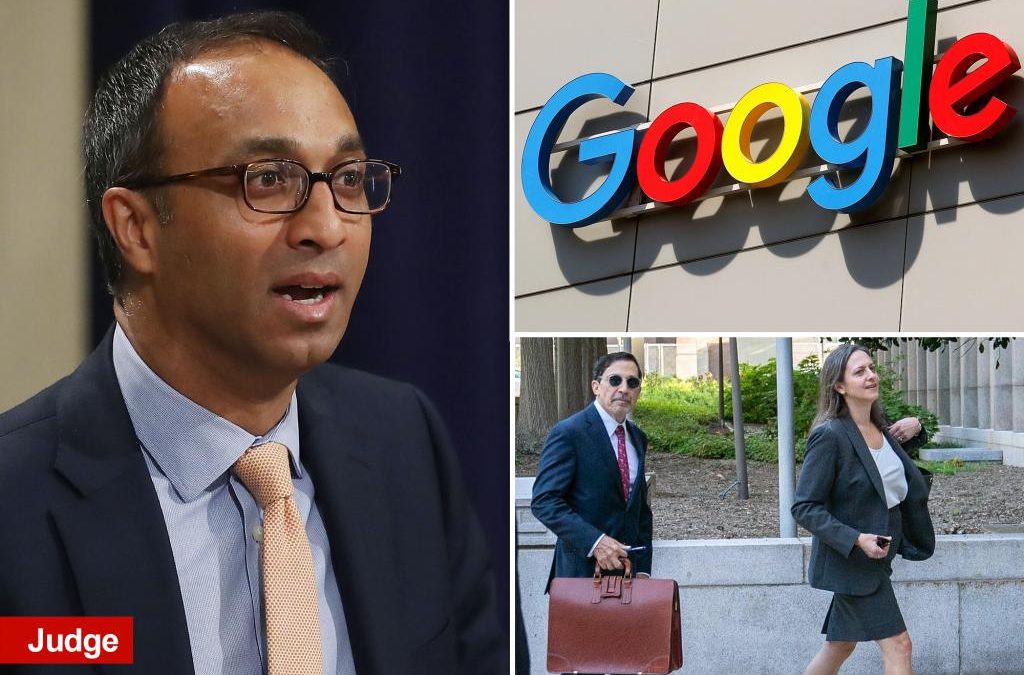The US Justice Department’s epic trial against Google kicked off on Tuesday with prosecutors claiming that the tech giant “pays more than $10 billion per year” to companies including Apple to protect the dominance of its ubiquitous search engine.
In addition to big smartphone makers like Apple and Samsung, the DOJ accused Google of paying eye-watering sums to wireless internet service providers including AT&T and browser makers like Mozilla in order to maintain its 91% share of the search engine market.
In what is seen as the most important antitrust monopoly trial of the modern internet era — a battle that’s expected to stretch for 10 weeks — the DOJ’s lead attorney Kenneth Dintzer blasted the yearly payments as a “feedback loop” that has unfairly helped Google sideline competitors.
“This wheel has been turning for more than 12 years,” Dintzer said during opening statements in a Washington, DC, federal courthouse. “And it always turns to Google’s advantage.”
“This case is about the future of the internet and whether Google’s search engine will ever face meaningful competition,” he added in his opening arguments before US District Judge Amit Mehta.

Dintzer touched on the supposed Google-Apple relationship in his opening remarks, calling the agreements an “Achilles Heel” for rival search engines offered by Yahoo and MSN, and suggesting that Google refused to share revenue data with Apple without “default placement” on its devices.
“Your honor, this is a monopolist flexing,” he said, according to The New York Times, noting that Google’s internal chat system automatically deletes messages after 24 hours.
“They turned history off, your honor, so they could rewrite it here in this courtroom,” Dintzer said.
In response, John Schmidtlein, a partner at Williams & Connolly, argued on Tuesday that the DOJ has painted an inaccurate picture of the company.
“Users today have more search options and more ways to access information online than ever before,” he said, per The Times.
He also shared that Apple users can change the default search engine on their devices in just “a few easy clicks.”
And if they don’t know how, they could watch a how-to video on YouTube, which Google owns, Schmidtlein told Mehta, the former President Barack Obama-appointed district judge who was randomly selected to preside over the case.
Mehta will be the sole decider of whether Google has illegally protected its omnipresent search engine from competitors as the DOJ alleges.
There won’t be a jury.


Ahead of the trial, Google has argued that its deals with phone makers including Apple — which reportedly has taken as much as $15 billion a year in payments from Google — were not exclusive, as consumers were free to alter the default settings on their devices.
Despite commanding at least 90% of the internet search market, Google’s president of global affairs Kent Walker told The Post last week: “People don’t use Google because they have to — they use it because they want to. It’s easy to switch your default search engine — we’re long past the era of dial-up internet and CD-ROMs. Our success is hard fought, and the result of our focus on building services that help Americans every day. We look forward to making our case in court.”
In a blog post Walker shared earlier this month titled “People use Google because it’s helpful,” Walker reiterated that the DOJ’s arguments are “deeply flawed,” and pointed to Mehta’s narrowing of the case earlier this month, when he dismissed four counts of the lawsuit after determining that government attorneys had failed to show the company damaged rivals like Yelp and Expedia with its online search practices.
Google declined to comment on the case beyond Walker’s blog post.
Walker was reportedly present in court on Tuesday.
Many of Walker’s points were echoed in Schmidtlein’s opening statements.
Over the next 10 weeks, Google CEO Sundar Pichai, as well as top executives from a slew of tech companies, are expected to be called as witnesses.
Court documents have suggested that Eddy Cue, Apple’s senior vice president of services, who reports directly to CEO TIm Cook, will take the stand.

Even before the trial kicked off, legal teams on both sides have been aggressive in making their cases.
Collectively, the DOJ and Google have already collectively deposed more than 150 individuals for the case, and have produced more than 5 million pages of documents in preparation for the epic trial.
Google has also recently argued in a court filing that the Justice Department’s head of antitrust, Jonathan Kanter, has a “deep-seated bias” against the company due to his past work for Google rivals such as Microsoft, Yelp and New York Post parent News Corp.
Should Mehta decide that Google broke the law, there will be a separate trial determining the next steps the Mountain View, Calif.-based company needs to take.

The Justice Department has asked that Google change its allegedly unlawful business practices, potentially pay damages and restructure its businesses.
Representatives for the Justice Department did not immediately respond to The Post’s request for comment.
As of early afternoon on Tuesday, shares of Google parent Alphabet were down nearly 1%, to $135.84.
With a value of $1.72 trillion, Google is the fourth-largest company in the world by market cap.
Source




